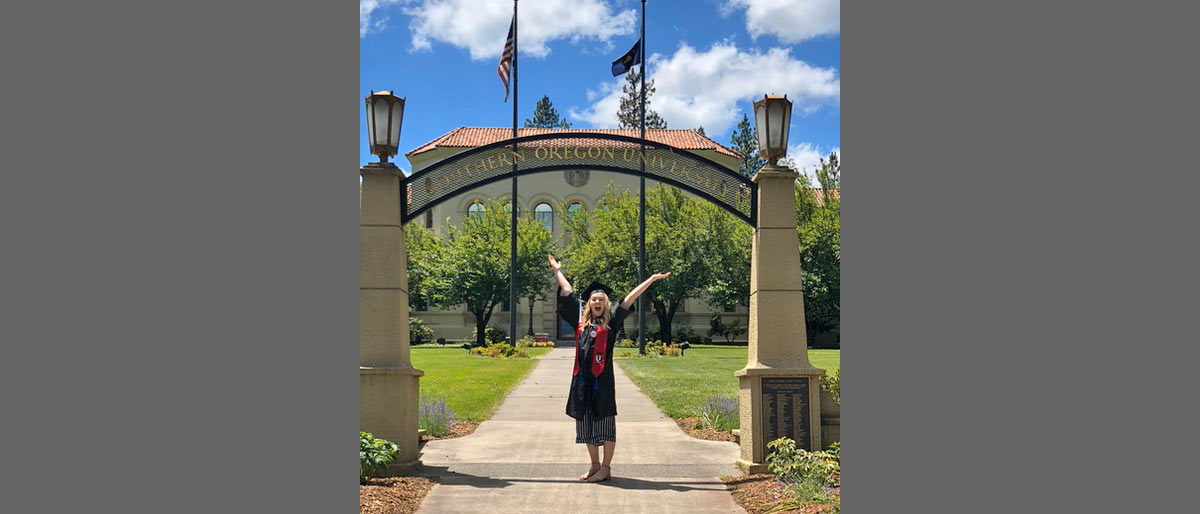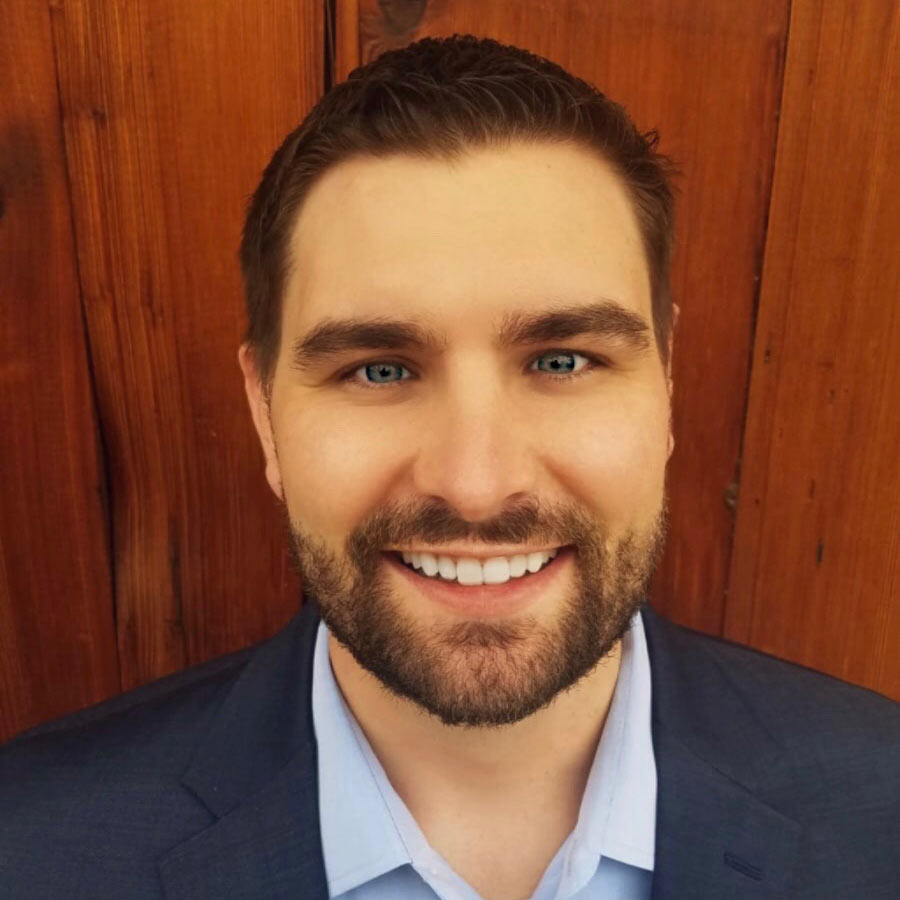- be_ixf; php_sdk; php_sdk_1.4.18
- 11 ms
- iy_2025; im_04; id_25; ih_22; imh_45; i_epoch:1.74564635124E+12
- ixf-compiler; ixf-compiler_1.0.0.0
- py_2025; pm_04; pd_07; ph_23; pmh_03; p_epoch:1.74409222402E+12
- link-block; link-block_link-block; bodystr
- pn_tstr:Mon Apr 07 23:03:44 PST 2025; pn_epoch:1.74409222402E+12
- 0 ms
- be_ixf; php_sdk; php_sdk_1.4.18
- https://sou.edu/academics/so-you-want-to-go-to-graduate-school-or-law-school/
- https://sou.edu/academics/so-you-want-to-go-to-graduate-school-or-law-school/

What Can You Do with an English Major?
So you want to go to graduate school or law school?
June 10, 2022
By Sophia Lorusso (she/her), Junior English Major.
Pictured above: Alexis Brooks graduating with her BA in English.
In the beginning of spring term 2022, the SOU English Program hosted an informational Grad and Law School Panel for students. All four of the panelists are SOU English alumni who are furthering their education while utilizing their English degree: Jenean Mcgee (’15), Alexis Brooks (’18), Logan Brooks (’18), and Samara Diab (’19).
Graduate School
Graduate school is one of many options after completing an undergraduate degree. Graduate school can be a master’s degree and/or a Ph.D. program. Depending on the program, a Graduate Record Examinations (GRE) test may be required for acceptance. Other materials you may need are at least three letters of recommendation, a personal statement/statement of purpose, resume, writing sample, and transcripts.
Jenean Mcgee earned her MA in American Studies from University of Massachusetts Boston and is currently a Ph.D. candidate at the University of Colorado, Boulder. Being a Ph.D. candidate means that she has completed all her Ph.D. requirements but is still working on her dissertation. She attributes her motivations to further her education to the SOU English Program and more specifically Dr. Alma Rosa Alvarez.
Jenean always wanted to be a teacher; throughout her undergrad, she was inspired by Dr. Alvarez’s teaching technique to teach at the college level. Jenean expressed, “I really want to teach at a college level and have that type of curriculum to engage with students and especially students of color who might not be familiar with their own cultural relevance in the US.”
Alexis Brooks is currently pursuing an MA in English at the University of Nevada Las Vegas. Alexis credits her English classes, professors, and her job at the SOU Writing Center for helping her succeed in her master’s program. Alexis explained a master’s degree as “what you make it. It largely depends on how you approach the work and who you decide to work with – what professors you work with and how they approach their work.”
Jenean and Alexis explain that a master’s program is a deep dive into research in a specific field while using other scholars’ work, while a Ph.D. is when you put yourself into the conversation with scholars. Graduate school is an opportunity to hone in on your specific interests and skills, which is why it is important to surround yourself with people whose work and focuses align with yours.

Pictured Above: Logan Brooks.
Law School
The application process to get into law school is much like the Common Application, but through the Law School Administration Council (LSAC) application. With the LSAC, you are able to upload all supporting documents and test scores and apply to desired schools. Either a Law School Admission Test (LSAT) or GRE is required to get into law school. Logan Brooks took the LSAT while Samara Diab took the GRE.
“Law is something that melds well with an English degree.”
– Logan Brooks
Logan Brooks recently graduated from the University of Oregon School of Law and is now a practicing business attorney in Portland. For Logan, it was a natural progression from studying English to Law: “Law is something that melds well with an English degree. It involves critical thinking, writing, communication skills, analytical thinking – all the things that you do in the classroom every day.” Logan was able to combine his interest in business and his love for English through a law career.
Samara Diab is in her final year of law school, where she is focusing on public-interest law at the University of Arizona. During her time as an English major at SOU, Samara enjoyed the linguistics courses she took with Dr. Ed Battistella. She loved dissecting and translating the English language, so law school came naturally as well because she was able to incorporate linguistics with her hard-working mentality as a law student.
Samara explains that as an attorney, you act as a translator for your clients. Law students learn legalese and all aspects of the law, then translate these complexities into understandable terms for everyday people.
General Advice
- Collecting all necessary documents for applications will take time – start early!
- GRE and/or LSAT scores are extremely important for grad/law school. Attending study sessions or taking courses to help will be beneficial in the long run.
- Network as much as possible. Before attending grad or law school, do your research on the faculty members who may fit best as your mentor or advisor. Establish relationships with those around you and do not be afraid to change advisors if needed.
- Master’s degrees, Ph.D. programs, and law schools all have financial-aid options. There are many master’s degrees that may give you funding along with a housing stipend, and you could get a graduate assistant position working for the school as well. Ph.D. programs are usually fully funded; if they aren’t then you may be able to defer acceptance until they have the money to fully fund you. For law school, scholarships are available and if your test scores and GPA are higher than their median, you may be able to negotiate your scholarship.
- It is normal to apply to multiple programs and get rejected! It may take a couple of application rounds to find the program that’s the best fit for you.
The panelists reminded us that applying and enrolling in grad/law school can be scary and you may feel like you have impostor syndrome at times. To curb impostor syndrome, it is helpful to remind yourself that you are in the right place. Samara Diab didn’t realize that she was in the right place until the end of her second year of law school when she noticed that her peers were in the same boat as she was – confused but learning. Alexis Brooks advises to not get mixed up in others’ expectations: “It’s important to zero in on what is important to you about your degree and not so much on the comparison of who you are in relation to other people.”
Thanks to Dr. Alma Rosa Alvarez and Dr. Diana Maltz for organizing this panel!
If you are interested in collecting your documents for grad/law school and need advice on resumes or other documents, contact Max Brooks ( brooksm@sou.edu ) our career preparation coordinator at SOU.
Interested in being featured on the English Program blog? Or know someone who is interested? Contact the author at lorussos@sou.edu


